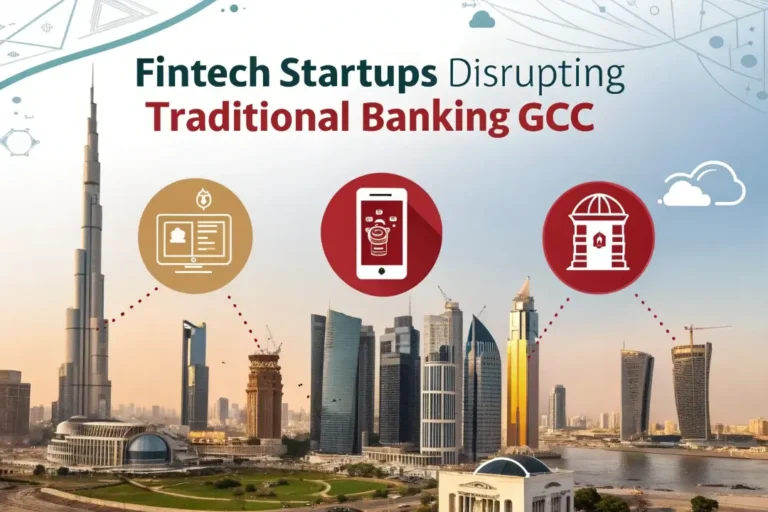
How Fintech Startups are Disrupting Traditional Banking in the GCC
The economic landscape of the Gulf Cooperation Council (GCC) is undergoing a profound change. Long dominated by big, established banking organizations, the sector is now being quickly transformed by FinTech startups. These small, technology-driven organizations are not just complementing current banking services—they are disrupting the established order and redefining the delivery of financial services in the region.
The Rise of Fintech in the GCC
Fintech adoption has increased significantly over the past few years, driven by a young, digitally native population and high levels of smartphone penetration. The GCC’s fintech market is expected to exceed $3 billion by 2025, as per industry estimates. The UAE, Saudi Arabia, and Bahrain are among the most prominent fintech hubs, fueled by government-led initiatives like the UAE’s FinTech Hive, Saudi Arabia’s Fintech Saudi, and Bahrain’s FinTech Bay. These initiatives enable innovation and promote a culture of experimentation where startups can create and bring to market financial services quicker than ever.
Key Areas of Disruption
One of the most heavily disrupted areas is digital payments and remittances. Fintech startups such as PayTabs, Telr, and Tamara are transforming payment systems using digital wallets, mobile payments, and buy-now-pay-later facilities. These products provide increased convenience, speed and reduced costs—features that appeal to the region’s consumers as well as merchants. For the GCC’s large expatriate community, fintech also provides cheaper, faster, and more transparent cross-border remittance solutions.
Fintechs are also making some strong inroads into lending and credit services. Mainstream banks tend to eschew small and medium enterprises (SME) or otherwise credit-uncovered individuals from being lent to. However, fintech lenders Beehive and Tamam leverage non-traditional data and artificially intelligent risk analysis models to supply peer-to-peer and digital micro-lending offerings. Not only does this further capital access but it also solves well-entrenched gaps in access to finance.
Fintech is also transforming the investment space with robo-advisory and online wealth management. Portals like Sarwa and Wahed offer cheap, automated investment guidance based on specific targets. By reducing barriers to entry and streamlining investment procedures, these startups are making financial planning accessible—particularly to younger demographics who might have been ignored by conventional wealth managers
Open banking is another significant frontier. Projects in Bahrain and Saudi Arabia are building out environments that enable fintechs to access consumer banking information securely via APIs. This encourages innovation and enables users to have more integrated and personalized financial experiences. Open banking is propelling the creation of smart budgeting apps, aggregated account dashboards, and other products that place the user at the center of their financial experience.
Supportive Regulations and Ongoing Challenges
Governments throughout the GCC are also taking a leading role in enabling fintech development. Regulatory sandboxes in the UAE, Saudi Arabia, and Bahrain enable startups to pilot their solutions under regulatory supervision, minimizing risk while promoting innovation. Nevertheless, the industry still has challenges. Regulatory fragmentation between countries, data privacy, and cybersecurity threats are still major issues. Additionally, FinTechs need to establish trust with customers who are used to the stability and security of conventional banks.
A Shift Towards Collaboration
Whereas the disruption narrative tends to set FinTechs against banks, the situation in the GCC is more complex. More and more traditional banks are working with FinTech startups to co-create products, implement new technologies, and enhance customer experiences. Emirates NBD, for example, has initiated innovation programs and collaborated with fintechs to drive its digital transformation. Likewise, Saudi banks are most of them putting their digital initiatives in line with the objectives of Vision 2030, and that is seeks to diversify the economy away from oil dependency by promoting technology innovation.
Looking Ahead
The GCC fintech revolution is no mere passing fad—it heralds a fundamental shift in the financial industry. As regulation evolves and consumer aspirations increase, FinTechs are likely to take on an even more prominent role. But their long-term success will hinge on successfully scaling sustainably, having strong data security, and building customer confidence. Conventional banks, on the other hand, will have to adopt digital transformation or face irrelevance. Ultimately, banking’s future in the GCC will probably be shaped by convergence and not confrontation. Through combining fintech startups’ innovation with established banks’ stability and accessibility, the region is constructing a more user-friendly, efficient, and inclusive financial environment.






